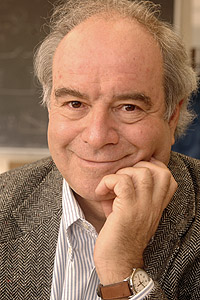![[Chronicle]](/images/sidebar_header_oct06.gif)
Vol. 26 No. 5
current issue
archive / search
contact
Past Opine interviews:
Lauren Berlant
Stephen Berry
John Boyer
David Cohen
Jerry Coyne
John Cunningham
Richard Epstein
John Frederick
Henry Frisch
Austan Goolsbee
Bernard Harcourt
Greg Jackson
Martin Marty
Martha Nussbaum
Raymond Pierrehumbert
José Quintáns
Jan-Marino Ramirez
Saskia Sassen
William Sewell
Herman Sinaiko
Geoffrey Stone
Cass Sunstein
Simon Swordy
Opine: Henry Frisch
 Henry Frisch, Professor of Physics and the College | |
This week, Henry Frisch, Professor in Physics and the College, is of the opinion . . .
What book would you recommend every person read and why?
The Old Testament. I thought a lot about which single book. It’s an uncomfortable question in that any one book I name you can argue against except, arguably, the Old Testament. It covers such a wide range of human experience and is common to so many things. But in general, I would say that I wouldn’t choose any single book to be read by every person. I have my favorite books, but it’s a collection of favorite books and I wouldn’t pick one.
Who — dead or alive — is your favorite scholar, author, composer, musician, entrepreneur? Of these people, who is the one person you’d prefer to meet and converse with?
There are some people I’d love to be able to call back. You can ask, who are the people I most enjoyed being with. Richard Feynman (1965 Nobel laureate in physics) was just wonderful to be with in terms of liveliness, honesty, thoughtfulness and creativity.
My favorite composer? I think Mozart. I can’t imagine what I’d say to Mozart. I might enjoy drinking with him. Victor Weisskopf, who was a famous physicist, used to say that Mozart played to the angels and Beethoven played to God. I think in terms of interviewing, you’re probably safer with the angels.
The question is, what would I like to learn and from whom? I just spent a couple of days with somebody I really learned enormous amounts from, James Bjorken. He was on the faculty here, now retired. A truly great physicist. That’s tremendous fun, to hear him thinking about things.
If you consider some of the most complex moral and political issues that affect humanity, which issue/problem do you believe will never be resolved and why?
Why are we so intent on killing each other? And what comes with that in a certain sense is why organized religion doesn’t take on this issue of protecting innocents.
I was just reading again The Once and Future King by T.H. White. At one point, Merlin turns Wart, the young Arthur, King Arthur to be, into a goose. There’s a young female goose who is his mentor and talks to him, and she’s appalled that he thinks they have sentries in order to keep that group of geese from being attacked by another group of geese. She says, What kind of animal would kill its own? What are you thinking, and what kind of mind do you have that you would think there is an animal that would kill its own en masse?
If you could choose any three University professors and give them a one-year sabbatical together to solve a problem, develop a theory or make a discovery, what task would you assign them to work on?
If I really felt that a one-year sabbatical would do it, I think the University would be doing that already.
The University has many traditions, some academic, such as the Humanities Open House and the Aims of Education Address, and some more recreational, such as the Latke-Hamantash Debate and the annual student Scavenger Hunt. If you were asked to create a new University tradition, what would it be?
I guess this is mundane, but I would like to see our honorary-degree policy changed so that it is not just for scholarship, that it has a broader view of achievement. I would like to see our honorary degrees go to people whom we consider moral beacons, or humanitarian beacons or models beyond the narrow educational roles for which we give honorary degrees now. It used to be that way. If you go back through the honorary degrees, you see that they were given very broadly in the past, very early. It’s not true that it’s always been for scholarship.
When Phil Jackson coached the Bulls, I thought he was an ideal candidate, very much a scholar in some sense. You have to really be a student of the game and a student of people. Phil Jackson, if anybody, was a psychologist. Paul McCartney is another of my favorite choices. You can say, well, he doesn’t even read music. On the other hand, millions — maybe billions — of people love his music. Is he a scholar? I would say yes.
Think of a renowned scholar from the past, now dead, who added great value to your area of study. Who is this person, and what do you believe this person would think of the advances that have been made in this area?
Consider Galileo. And what would he think of the advances we’ve made in this area? I have no idea. That would be the fun. But from what little I have read about Galileo, he was a very modern man. We give ourselves too much credit to think that Galileo is like us, rather than we are like him.